March 30, 2012 report
Birds found to put more energy into current brood when ill

(PhysOrg.com) -- In an interesting study designed to find out how birds make choices, whether consciously or not, about how much effort to expend on offspring when ill, a team from Illinois State University has found that at least for house wrens, giving their all up front makes more sense than saving their strength to recover and reproduce another day. In their paper published in Proceedings of the Royal Society B, the team explains how they analyzed the birds’ decision-making by artificially inducing illness symptoms in a group of wrens and then measuring their offspring for robustness.
It’s an interesting dilemma for animals of any species, what to do about reproducing when suffering from an illness. On the one hand, it might seem to make more sense to not reproduce at all until regaining full strength. But that approach only works, as far as reproduction issues are concerned, if recovery from the illness is likely. If there isn’t any certainty about recovery, then reproducing right away might seem to be the smartest approach, as would be giving those offspring everything you have to ensure their survival, at least if reproduction is a top priority.
For house wrens, it appears the latter approach makes more sense. After the team injected a group of brooding hens with lipopolysaccharide (LPS), a substance that causes the immune system to react as if an infection were present and another control group with a simple saline solution, eggs were laid which were immediately removed to allow the birds to “decide” whether to breed again immediately or to wait till they felt better. All of the birds in both groups “chose” to breed again right away which led to fertilized eggs arriving at nearly the same time for all of them and all with approximately the same size clutch.
Then, to find out if the hens had given more to their offspring when creating their eggs, due to being ill, the hatchlings were tested for size and immune response. They found that hatchlings from the “sick” hens that were male, were larger than average, and females had a more robust immune response when subjected to a real infectious agent.
Because of these differences from the norm, the team suggests that mothers that thought they were ill somehow gave more of themselves to their offspring to give them a better chance of survival, even if it meant giving themselves less of a chance of recovery as a result of doing so.
More information: Sex-biased terminal investment in offspring induced by maternal immune challenge in the house wren (Troglodytes aedon), Published online before print March 28, 2012, doi: 10.1098/rspb.2012.0443
Abstract
The reproductive costs associated with the upregulation of immunity have been well-documented and constitute a fundamental trade-off between reproduction and self-maintenance. However, recent experimental work suggests that parents may increase their reproductive effort following immunostimulation as a form of terminal parental investment as prospects for future reproduction decline. We tested the trade-off and terminal investment hypotheses in a wild population of house wrens (Troglodytes aedon) by challenging the immune system of breeding females with lipopolysaccharide, a potent but non-lethal antigen. Immunized females showed no evidence of reproductive costs; instead, they produced offspring of higher phenotypic quality, but in a sex-specific manner. Relative to control offspring, sons of immunized females had increased body mass and their sisters exhibited higher cutaneous immune responsiveness to phytohaemagglutinin injection, constituting an adaptive strategy of sex-biased allocation by immune-challenged females to enhance the reproductive value of their offspring. Thus, our results are consistent with the terminal investment hypothesis, and suggest that maternal immunization can induce pronounced transgenerational effects on offspring phenotypes.
Journal information: Proceedings of the Royal Society B
© 2012 PhysOrg.com

















